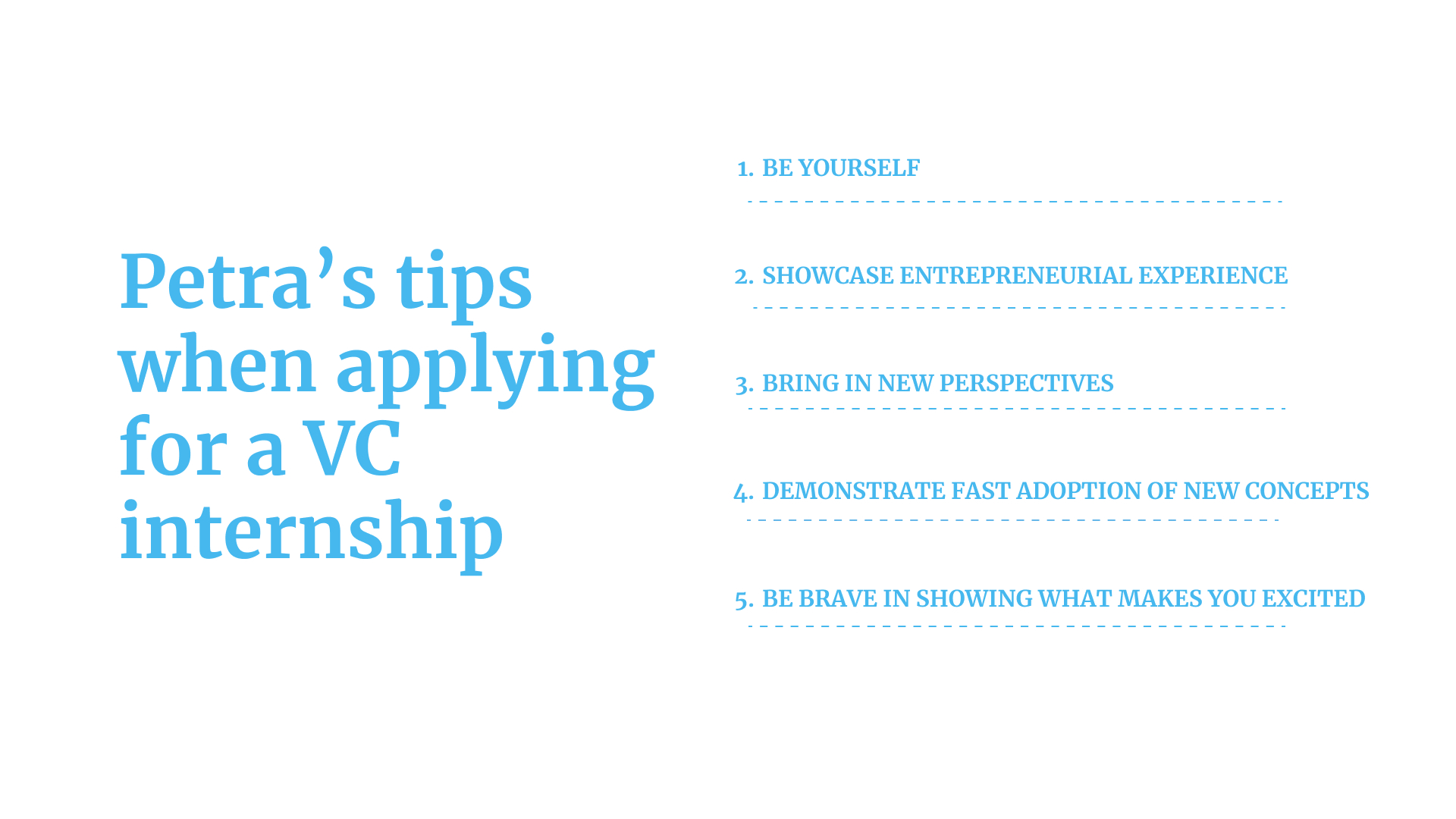Venture capital (VC) firms are highly sought-after destinations for MBA students aiming to gain hands-on experience in the world of startups, investments, and innovation. However, securing a summer internship in this competitive field often raises questions about the hiring processes these firms employ. Unlike traditional industries, VC firms may not always have structured internship programs, making the application process less transparent and more nuanced. This article explores whether VC firms follow standardized MBA internship hiring practices, the key steps to navigate this unique landscape, and actionable strategies to increase your chances of landing a coveted summer internship in venture capital.
- Do VC Firms Have Structured MBA Internship Hiring Processes and How Does One Go About Securing a Summer Internship?
- 1. Do Venture Capital Firms Offer Structured MBA Internship Programs?
- 2. What Are the Key Steps to Secure a Summer Internship in a VC Firm?
- 3. How Important Is Networking in Securing a VC Internship?
- 4. What Skills and Experiences Do VC Firms Look for in MBA Interns?
- 5. How Can MBA Students Prepare for VC Internship Interviews?
- How to get an internship at a venture capital firm?
- Do VC firms hire interns?
- How do I prepare for a VC internship?
- Do you need an MBA to work in venture capital?
- Frequently Asked Questions from Our Community
Do VC Firms Have Structured MBA Internship Hiring Processes and How Does One Go About Securing a Summer Internship?
1. Do Venture Capital Firms Offer Structured MBA Internship Programs?
Venture Capital (VC) firms often have structured internship programs tailored for MBA students, especially those with a focus on finance, entrepreneurship, or technology. These programs are designed to provide hands-on experience in deal sourcing, due diligence, portfolio management, and market analysis. However, the structure and availability of these programs can vary significantly depending on the size and focus of the firm. Larger, more established VC firms typically have formalized recruitment processes, while smaller firms may rely on networking and direct applications.
| Aspect | Details |
|---|---|
| Program Structure | Structured internships often include mentorship, project-based work, and networking opportunities. |
| Recruitment Process | Formal processes may include interviews, case studies, and networking events. |
2. What Are the Key Steps to Secure a Summer Internship in a VC Firm?
Securing a summer internship in a VC firm requires a proactive approach. Start by researching firms that align with your career goals and interests. Networking is crucial—attend industry events, connect with alumni, and leverage LinkedIn to build relationships. Tailor your resume to highlight relevant skills such as financial analysis, market research, and entrepreneurial experience. Finally, prepare thoroughly for interviews, which often include case studies to assess your analytical and problem-solving abilities.
See Also Is Goldman Sachs or Venture Capital a Better Career Starter?
Is Goldman Sachs or Venture Capital a Better Career Starter?| Step | Action |
|---|---|
| Research | Identify VC firms that match your interests and career goals. |
| Networking | Attend events, connect with professionals, and seek informational interviews. |
| Application | Submit a tailored resume and cover letter highlighting relevant skills. |
3. How Important Is Networking in Securing a VC Internship?
Networking is critical in the VC industry, where many opportunities are filled through referrals and personal connections. Building relationships with professionals in the field can provide insights into unadvertised positions and increase your chances of being recommended for internships. Attend industry conferences, join VC-related clubs or organizations, and engage with professionals on platforms like LinkedIn to expand your network.
| Networking Strategy | Impact |
|---|---|
| Informational Interviews | Gain insights and build relationships with industry professionals. |
| Industry Events | Meet potential mentors and learn about internship opportunities. |
4. What Skills and Experiences Do VC Firms Look for in MBA Interns?
VC firms typically seek MBA interns with a strong background in finance, strategy, and entrepreneurship. Analytical skills, such as financial modeling and market research, are highly valued. Additionally, experience in startups, consulting, or investment banking can make you a more competitive candidate. Demonstrating a passion for innovation and a deep understanding of emerging technologies is also essential.
| Skill/Experience | Importance |
|---|---|
| Financial Modeling | Critical for evaluating investment opportunities. |
| Market Research | Helps in identifying trends and potential investments. |
| Startup Experience | Provides practical insights into entrepreneurship. |
5. How Can MBA Students Prepare for VC Internship Interviews?
Preparing for VC internship interviews involves mastering case studies, understanding the firm’s investment focus, and being able to articulate your interest in venture capital. Practice solving case studies that involve market sizing, competitive analysis, and investment recommendations. Additionally, stay updated on industry trends and be ready to discuss your thoughts on recent deals or emerging technologies.
See Also How to Start a Tech Company with no Experience
How to Start a Tech Company with no Experience| Preparation Area | Details |
|---|---|
| Case Studies | Practice analyzing markets, competitors, and investment opportunities. |
| Industry Knowledge | Stay informed about recent deals, trends, and emerging technologies. |
| Firm Research | Understand the firm’s portfolio, investment thesis, and culture. |
How to get an internship at a venture capital firm?

Understanding the Venture Capital Industry
To secure an internship at a venture capital (VC) firm, it is crucial to first understand the industry and its dynamics. Venture capital involves investing in early-stage or high-growth companies with significant potential. Interns are expected to have a foundational knowledge of how VC firms operate, including deal sourcing, due diligence, and portfolio management. Here’s how you can build this understanding:
- Research the VC ecosystem: Learn about key players, investment stages, and industry trends.
- Follow VC blogs and podcasts: Stay updated on insights from prominent investors and firms.
- Understand financial metrics: Familiarize yourself with terms like valuation, cap tables, and term sheets.
Building Relevant Skills and Knowledge
VC firms look for candidates with a mix of analytical, financial, and interpersonal skills. To stand out, you need to demonstrate expertise in areas like financial modeling, market research, and startup evaluation. Here’s how to build these skills:
See Also Are Moic and Irr the Most Important Financial Metrics to Track in a Venture Capital Portfolio
Are Moic and Irr the Most Important Financial Metrics to Track in a Venture Capital Portfolio- Learn financial modeling: Take online courses or use resources to master Excel and financial analysis.
- Develop market research skills: Practice analyzing industries and identifying emerging trends.
- Understand startup metrics: Study key performance indicators (KPIs) like customer acquisition cost (CAC) and lifetime value (LTV).
Networking with Industry Professionals
Networking is a critical component of landing a VC internship. Many opportunities arise through referrals or connections within the industry. Here’s how to effectively network:
- Attend industry events: Participate in VC conferences, startup pitch events, and networking meetups.
- Leverage LinkedIn: Connect with VC professionals, engage with their content, and request informational interviews.
- Join VC communities: Participate in online forums or groups focused on venture capital and startups.
Tailoring Your Resume and Cover Letter
Your application materials should highlight your relevant experience, skills, and passion for venture capital. Tailor your resume and cover letter to align with the specific firm’s focus and values. Here’s how to do it:
- Highlight relevant experience: Include internships, projects, or roles that demonstrate your interest in startups or finance.
- Showcase transferable skills: Emphasize skills like data analysis, communication, and problem-solving.
- Personalize your cover letter: Explain why you’re interested in the firm and how your background aligns with their mission.
Preparing for the Interview Process
The interview process for VC internships often includes case studies, technical questions, and behavioral assessments. Preparation is key to succeeding in these interviews. Here’s how to prepare:
See Also Why Should I Choose Equity Crowdfunding Instead of Venture Capital
Why Should I Choose Equity Crowdfunding Instead of Venture Capital- Practice case studies: Work on sample cases that involve evaluating startups or making investment decisions.
- Review technical concepts: Be ready to discuss financial metrics, market sizing, and competitive analysis.
- Prepare for behavioral questions: Reflect on past experiences that demonstrate teamwork, leadership, and problem-solving.
Do VC firms hire interns?
Do Venture Capital Firms Offer Internship Opportunities?
Yes, many venture capital (VC) firms do hire interns, especially those that are well-established or have a structured program for young professionals. Internships in VC firms are highly competitive and often sought after by students and recent graduates interested in finance, entrepreneurship, or technology. These roles provide valuable exposure to the startup ecosystem, deal sourcing, and investment analysis.
- Exposure to the VC ecosystem: Interns gain firsthand experience in evaluating startups, understanding market trends, and participating in due diligence processes.
- Networking opportunities: Interns often interact with founders, investors, and other professionals in the industry, building a strong network.
- Skill development: Interns develop skills in financial modeling, market research, and presentation, which are critical for a career in venture capital.
What Types of Internships Do VC Firms Offer?
VC firms typically offer internships in various roles, including investment analysis, operations, and marketing. These internships can be part-time, full-time, or even remote, depending on the firm's needs and the intern's availability.
- Investment Analyst Internships: Focus on deal sourcing, financial modeling, and market research.
- Operations Internships: Involve supporting the firm's internal processes, such as portfolio management and investor relations.
- Marketing Internships: Help with branding, content creation, and event planning to promote the firm's activities.
What Qualifications Do VC Firms Look for in Interns?
VC firms typically seek candidates with a strong academic background, relevant coursework, and a demonstrated interest in startups or finance. Analytical skills, communication abilities, and a proactive attitude are highly valued.
See Also How Do Associates at Venture Capital Firms Source Deals?
How Do Associates at Venture Capital Firms Source Deals?- Educational background: Degrees in finance, business, economics, or related fields are preferred.
- Relevant experience: Prior internships in startups, consulting, or investment banking can be advantageous.
- Passion for startups: A genuine interest in entrepreneurship and innovation is often a key requirement.
How Competitive Are VC Internships?
VC internships are highly competitive due to the limited number of positions and the high demand from aspiring professionals. Candidates often need to demonstrate exceptional skills, a strong network, and a clear understanding of the VC industry.
- Limited openings: VC firms are typically small, with only a few internship spots available.
- High demand: Many students and graduates aspire to work in venture capital, increasing competition.
- Rigorous selection process: Candidates may undergo multiple rounds of interviews and case studies to assess their fit.
What Are the Benefits of Interning at a VC Firm?
Interning at a VC firm offers numerous benefits, including industry exposure, skill development, and career advancement opportunities. It is an excellent way to break into the venture capital or startup ecosystem.
- Industry insights: Interns gain a deep understanding of how VC firms operate and make investment decisions.
- Career opportunities: Successful interns may receive full-time job offers or referrals to other firms.
- Hands-on experience: Interns often work on real projects, contributing to the firm's success while building their resume.
How do I prepare for a VC internship?

Understand the Venture Capital Industry
To prepare for a VC internship, it is crucial to understand the venture capital industry thoroughly. Start by researching how venture capital firms operate, their investment strategies, and the types of startups they typically fund. Familiarize yourself with key concepts such as term sheets, valuation, and due diligence. Additionally, follow industry news and trends to stay updated on the latest developments.
- Research the structure and function of venture capital firms.
- Learn about investment stages (seed, Series A, B, etc.) and what each entails.
- Follow industry leaders and thought influencers on platforms like LinkedIn and Twitter.
Develop Financial and Analytical Skills
A strong foundation in financial and analytical skills is essential for a VC internship. You should be comfortable with financial modeling, valuation techniques, and interpreting financial statements. Practice analyzing startups' financial health and projecting their growth potential. Familiarity with tools like Excel and financial software will also be beneficial.
- Learn financial modeling and valuation techniques.
- Practice interpreting income statements, balance sheets, and cash flow statements.
- Use tools like Excel and financial analysis software to enhance your skills.
Build a Network in the Startup Ecosystem
Networking is a critical component of preparing for a VC internship. Build relationships with entrepreneurs, startup founders, and other professionals in the venture capital space. Attend industry events, join relevant online communities, and engage with thought leaders. A strong network can provide valuable insights and opportunities.
- Attend startup events, pitch nights, and industry conferences.
- Join online communities and forums related to venture capital and startups.
- Engage with mentors and industry professionals on platforms like LinkedIn.
Having hands-on experience in startups or related fields can significantly enhance your preparation for a VC internship. Consider working or interning at a startup to understand the challenges and dynamics of early-stage companies. Alternatively, gain experience in fields like investment banking, consulting, or product management, which are closely related to venture capital.
- Intern or work at a startup to gain firsthand experience.
- Pursue roles in investment banking, consulting, or product management.
- Volunteer for startup accelerators or incubators to understand their operations.
Hone Your Communication and Presentation Skills
Effective communication and presentation skills are vital for a VC internship. You will often need to present investment opportunities, write reports, and communicate with stakeholders. Practice creating concise and compelling presentations, and work on your ability to articulate complex ideas clearly.
- Practice creating investment memos and pitch decks.
- Work on public speaking and presentation skills.
- Seek feedback on your written and verbal communication from mentors or peers.
Do you need an MBA to work in venture capital?
Is an MBA Required for a Career in Venture Capital?
An MBA is not strictly required to work in venture capital, but it can be beneficial. Many venture capitalists come from diverse educational and professional backgrounds, including engineering, law, and entrepreneurship. However, an MBA can provide valuable skills and networking opportunities that are advantageous in the field.
- Networking: MBA programs often connect students with alumni and industry professionals, which can open doors in venture capital.
- Business Acumen: An MBA helps develop a strong understanding of business operations, financial modeling, and strategy, which are critical in venture capital.
- Credibility: Having an MBA from a top-tier institution can enhance your credibility when pitching to investors or founders.
What Skills Are Valued in Venture Capital Without an MBA?
Venture capital firms value a range of skills that can be acquired without an MBA. These include analytical thinking, industry expertise, and a strong network. Many successful venture capitalists have built their careers through hands-on experience and deep domain knowledge.
- Analytical Skills: The ability to evaluate startups and assess market potential is crucial.
- Industry Knowledge: Deep expertise in a specific sector can make you a valuable asset to a VC firm.
- Networking: Building relationships with entrepreneurs and other investors is often more important than formal education.
Can Experience Substitute for an MBA in Venture Capital?
Yes, experience can often substitute for an MBA in venture capital. Many venture capitalists have transitioned into the field after working in startups, consulting, or investment banking. Practical experience in building or scaling businesses can be just as valuable as academic credentials.
- Startup Experience: Working in a startup provides firsthand knowledge of the challenges and opportunities entrepreneurs face.
- Consulting Background: Experience in consulting can help develop strategic thinking and problem-solving skills.
- Investment Banking: A background in finance can be beneficial for understanding deal structures and financial analysis.
How Does an MBA Impact Your Venture Capital Career?
An MBA can significantly impact your venture capital career by providing structured learning, access to a strong network, and enhanced credibility. However, it is not the only path to success in the industry.
- Structured Learning: MBA programs offer courses in finance, strategy, and entrepreneurship that are directly applicable to venture capital.
- Alumni Network: Many MBA programs have strong alumni networks that can help you secure roles in VC firms.
- Career Transition: An MBA can facilitate a career switch into venture capital, especially for those coming from non-traditional backgrounds.
What Are the Alternatives to an MBA for Breaking into Venture Capital?
There are several alternatives to an MBA for breaking into venture capital, including gaining relevant work experience, building a strong personal brand, and leveraging your network. These paths can be equally effective in securing a role in the industry.
- Work Experience: Gaining experience in startups, consulting, or finance can provide the necessary skills and knowledge.
- Personal Brand: Building a reputation as an expert in a specific industry can attract the attention of VC firms.
- Networking: Attending industry events and connecting with venture capitalists can open doors to opportunities.
Frequently Asked Questions from Our Community
Do venture capital firms have structured MBA internship hiring processes?
Venture capital (VC) firms often have structured hiring processes for MBA internships, though the level of formality can vary depending on the size and reputation of the firm. Larger, more established VC firms typically follow a formal recruitment process, which may include posting internship opportunities on their websites, partnering with business schools, or attending career fairs. These firms often have dedicated HR teams to manage the hiring process. On the other hand, smaller or boutique VC firms may rely more on networking and referrals to identify potential candidates. In either case, the process usually involves multiple rounds of interviews, case studies, and assessments to evaluate candidates' analytical skills, industry knowledge, and cultural fit.
What steps should I take to secure a summer internship at a venture capital firm?
To secure a summer internship at a VC firm, start by researching firms that align with your career goals and interests. Many VC firms list internship opportunities on their websites or through university career portals. Networking is also crucial—attend industry events, connect with alumni, and reach out to professionals on platforms like LinkedIn. Tailor your resume and cover letter to highlight relevant skills such as financial analysis, market research, and entrepreneurial experience. Prepare thoroughly for interviews by practicing case studies and staying updated on industry trends. Additionally, consider leveraging your school's career services or alumni network for guidance and referrals.
What qualifications do VC firms look for in MBA interns?
VC firms typically seek MBA interns with a strong combination of academic excellence, analytical skills, and industry experience. A background in finance, consulting, or entrepreneurship is often preferred, as these roles provide relevant skills such as financial modeling, due diligence, and market analysis. Firms also value candidates who demonstrate a genuine passion for startups and innovation. Soft skills like communication, teamwork, and problem-solving are equally important, as interns often collaborate with portfolio companies and internal teams. Additionally, having a deep understanding of specific industries or emerging technologies can set you apart from other candidates.
How competitive is the process of securing a VC internship for MBA students?
The process of securing a VC internship is highly competitive due to the limited number of positions available and the high demand from MBA students. Top-tier VC firms often receive hundreds of applications for just a handful of spots. To stand out, candidates must demonstrate a unique blend of technical expertise, industry knowledge, and interpersonal skills. Building a strong network and gaining relevant experience through prior internships, startup projects, or entrepreneurial ventures can significantly improve your chances. Additionally, being proactive in your job search and showcasing a clear understanding of the VC landscape can help you differentiate yourself from other applicants.
Leave a Reply



Our Recommended Articles